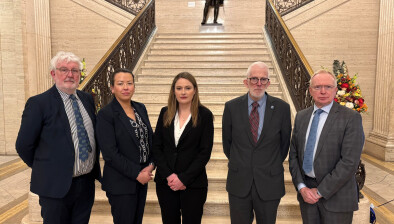NI: High Court clarifies exceptional nature of secondary case procedural legitimate expectation in addiction centre judicial review
The High Court has dismissed an application for judicial review brought by a former heroin addict who argued he had a “secondary case procedural legitimate expectation” to have been consulted by the Department of Justice before they ceased funding for an addiction service.

About this case:
- Judgment:
The applicant, Mr Charles Boyle, averred that the Railway Street Addiction Service was a “shining example” of what an addiction service should be, and that since becoming involved in with it he had managed to move away from the life of crime he had adopted in order to fund his addiction.
In relation to the withdrawal of the Department of Justice funding, he stated that he had received a letter from the Trust in November 2014 advising him of the Department’s intention to cease funding the service, leading to it closing in February 2015.
Although the letter stated that a worker would be in touch to advise him of the changes to his service, the applicant averred that this had not occurred.
His application rested on an alleged breach of his “secondary case procedural legitimate expectation” to have been consulted before the decision to cease funding was made.
This legitimate expectation is derived from the case of R (on the application of Bhatt Murphy (A firm) v Independent Assessor (2008) EWCA 755, which allowed for such an expectation to arise in cases where the impact of the authority’s past conduct on potentially affected persons was pressing and focused.
The applicant submitted that his case fell within the secondary procedural category, as he is an individual, one of a relatively small number of readily identifiable individuals, who will be directly affected by the decision to withdraw funding for the Railway Street Addiction Service.
He argued that the issue is “pressing” for the reasons set out in the affidavits lodged in support of the application and is “focused” insofar as the decision relates to a relatively small, specific group of persons.
However, the respondents submitted that it provided part funding to the Trust to run the Railway Street Service under a series of time limited Service Level Agreements, each of which anticipated the possibility of a future cessation of funding and set out the procedure through which this would be done.
The respondents argued that a secondary procedural legitimate expectation could only arise in exceptional circumstances, where despite the absence of any promise to consult or any established practice of consultation prior to the making of a decision, the lack of consultation in the particular fact situation would be so conspicuously unfair as to amount to an abuse of power by that authority in relation to a party affected by its decision.
Delivering the judgment, Treacy J noted that this was an attempt to expand a very exceptional ground of challenge to an administrate decision.
When delivering the decision in Bhatt Murphy, Laws LJ had discussed two cases in detail which found there to be a secondary case of procedural legitimate expectation.
The first, Ex parte Schemet (1993) 91 LGR 425, ELR 89, involved a local authority which without warning or consultation ceased to pay for a family’s travel to school.
The second, Ex parte Unilever (1996) STC 681 in which the Inland Revenue, after accepting late tax claims for twenty years, abruptly refused to do so.
These cases, he found, were examples of another form of restraint on administrative action, which is designed to prevent gross unfairness amounting to an abuse of power.
He concluded: “If, without any promise, it has established a policy distinctly and substantially affecting a specific person or group who in the circumstances was in reason entitled to rely on its continuance and did so, then ordinarily it must consult before effecting any change (the secondary case of procedural expectation). To do otherwise, in any of these instances, would be to act so unfairly as to perpetrate an abuse of power.”
Applying this test to the current case, Treacy J found that no secondary case of procedural legitimate expectation arose.
He noted that the general principle is that public authorities and administrative decision makers have a duty to review policies and to change them in response to a range of circumstances some of which may well necessitate an urgent change of tack.
He found that the secondary case of procedural legitimate expectation existed as a last resort to prevent discontinuance of policies without consultation with those affected where to do so would amount to conspicuous unfairness in the sense of “…act(ing) so unfairly as to perpetrate an abuse of power.”
It as noted that every policy change would affect an identifiable group of people and some of these groups may be very small, focused groups.
However, there must be something more precise and individual to make the particular change of policy unconscionable on the facts of the case.
In this case, the respondent had made funding grants which were subject to review and termination by a specified procedure, which was followed.
The Judge asked: “How strange would it be if an Applicant with no previous relationship at all to the Respondent and no basis for any claim based on the usual legitimate expectation grounds could somehow use the secondary case of procedural legitimate expectation to secure consultation rights that were never promised or offered by the authority at the time its policy was activated?”
He found that such an approach would “facilitate a wholesale shredding” of the autonomy of administrative decision makers, and would overburden public authorities with consultation obligations, undermining their capacity to discharge their functions efficiently.
It was noted that Laws LJ, when identifying the new category of secondary case procedural legitimate expectation, stressed how exceptional the category was, and quoted Lord Woolf in ex parte Coughlan, who stated that:
“In the ordinary case there is no space for intervention on grounds of abuse of power once a rational decision directed to a proper purpose has been reached by lawful process.”
Treacy J concluded that the present case was an example of an ‘ordinary case’ where a rational decision has been reached by a lawful process. The application therefore failed.









